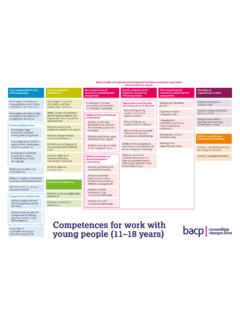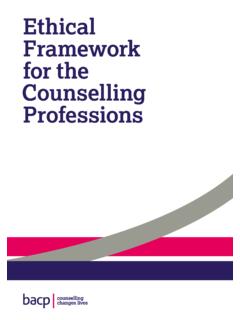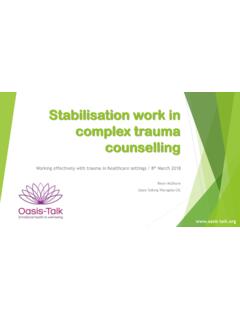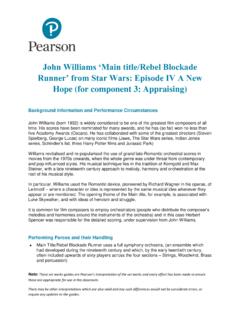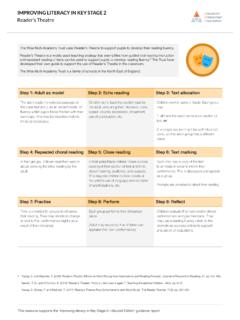Transcription of Counselling Supervision Training Curriculum
1 Counselling Supervision Training Curriculuma Curriculum framework for Counselling supervisor trainingBACP Professional StandardsIntroduction 1 Course information 3 Overall course aim 3 Course outline 3 Session 1: The supervisor in context 4 Session 2: Building the supervisory relationship 5 Session 3: Good practice in Supervision 6 Session 4: Enabling the supervisee to make use of Supervision 8 Session 5: Assessment in Supervision 9 Session 6: Ensuring standards in Supervision 10 Session 7: Working with a group in Supervision 12 Session 8a: Working with the supervisee s Counselling model 13 Session 8b: Working with the supervisee s Counselling model 15 Session 9: Working sensitively within the supervisory relationship 19 Course evaluation 20 Counselling supervisor course evaluation 20 Suggested reading 21 Further reading 22 Contents bacp 2014 bacp Counselling Supervision Training curriculumibacp Counselling Supervision Training Curriculum back to contents back to contents bacp Counselling Supervision Training curriculum01 IntroductionRationaleThis BACP Counselling Supervision Training Curriculum provides a consistent minimum standard to which Counsellor Supervisors should be trained.
2 The Counselling Supervision Training Curriculum offers Training providers a Curriculum framework for a comprehensive course, reflecting the Supervision competences and detailing the topics needed for Supervision Training . It highlights best practice and has a session-by-session guide for the is also recognised that Supervision Training is delivered through Higher Education (HE), Further Education (FE) and by private Training providers and different Training establishments have differing qualification, assessment and validation requirements that they have to fulfil. The Curriculum is indicative rather than prescriptive, recognising that trainers will need to adapt it to their setting and their students. Training providers will also have to adapt the Assessment criteria (Page 3)-Minimum standards to meet the requirements of the Framework for Higher Education Qualifications (FHEQ) and the NQF National Qualifications Framework/ Qualifications and Credit Framework Levels.
3 The competencesThe competences for Counselling and Counselling Supervision are on the UCL core website ( ). They identify the aspects of Counselling and Counselling Supervision practice that can be described as evidence based. The competences were commissioned by Care Services Improvement Partnership (CSIP), Skills for Health and NHS Education for Scotland. The first four frameworks cover the major therapeutic modalities these are cognitive and behavioural therapies, psychoanalytic/psychodynamic therapy, humanistic therapies and systemic therapies. The fifth framework sets out the competences needed for the Supervision of these therapies. As part of the IAPT (Improving Access to Psychological Therapies) initiative to broaden the choice of psychological therapies offered within the NHS, four competence frameworks were developed: Interpersonal Psychotherapy (IPT), Dynamic Interpersonal Therapy (DIT), Counselling for Depression (CfD) and Couples Therapy for Depression.
4 BACP recently developed competences for Humanistic Counselling for Young People (11 18 years) which are on the BACP website ( ). The development of BACP competence frameworks uses the Roth and Pilling methodology: the research evidence within a particular field is subjected to a systematic search; effective interventions are identified; and manuals of practice relating to these effective interventions are sought. This process is overseen by Expert Reference Groups who supply additional information, particularly where there are gaps in the research evidence, and provide peer review for the competence development process. The process is described in background documents on the UCL CORE website ( ).To understand the Supervision competences it is recommended that this document be read in conjunction with the Supervision Competences Background Document ( ). The Counselling Supervision competences are grouped under the following Supervision competencesThis covers the competences that underpin Supervision of all therapy modalities.
5 It describes areas of practice such as establishing and maintaining a working alliance with a supervisee, fostering the ability to work with difference and ability to enable ethical Supervision competencesThis domain describes specific competences for Supervision , including working with groups in Supervision and the ability to apply of Supervision to specific models or contextsEach modality has a separate set of competences that describes Supervision practice specifically for that of the metacompetences are concerned with the subtle judgments that a supervisor needs to make, including adapting the process and content of Supervision and managing concerns about the supervisee s ability to use competences and the curriculumThe session content for this Curriculum has been drawn from the Supervision competences as these describe best practice. The course follows the wording of the competences closely. The competences have been grouped together, referenced (eg generic competence 5), and put under session headings to form the overall content of the course.
6 For fuller details of each competence before teaching the sessions please refer to the Supervision competences. Each session has an overarching title and an aim. There are two sets of objectives as this course can be delivered at post-qualification certificate or diploma level. This Curriculum has followed the descriptors for the QAA National Framework for Qualifications to set the aims and objectives for certificate and diploma level. The difference in the two levels is that diploma level students need to show a greater understanding of the topics that are taught by being able to analyse their work. BACP understands that each course provider will need to go through the required process to have a particular course accepted by their awarding body and therefore the course may need to be adapted to meet the standards of the provider and the awarding Counselling Supervision Training Curriculum back to contents back to contents bacp Counselling Supervision Training curriculum02 How to use the curriculumThe Supervision Curriculum is designed to be used flexibly, with trainers deciding the order in which the sessions are taught and the way in which they are taught.
7 This is a generic Supervision course with two sessions covering the modalities. The course is designed to allow the provider to decide which modality is taught and it is not expected that all modalities will be covered in those sessions. All modalities are covered in this course so that it can be used by all models; it is intended that students learn to supervise using the model of therapy they have been trained to deliver and will be using with their supervisees. It is not the intention of this course to train supervisors to be able to work with all modalities, regardless of their Training . Some topics appear once on the Curriculum and are connected to the values that underpin the course. These themes should be referred to throughout the course; for example, working ethically and working with difference. The Curriculum covers many areas in each session; it is therefore recommended that trainers begin sessions by consolidating the learning and topics from the previous is a practitioner course and leads to a qualification in Counselling Supervision .
8 An important component is to acquire the practice of Supervision skills. Students are expected to offer Counselling Supervision while attending the course and will be required to provide a log of their Counselling Supervision hours. There is time in the sessions for a practical element of the course where students can practise Counselling Supervision skills with their peers. These sessions will not form part of the Counselling Supervision hours needed to meet the course deliveryIn recognition that tutors have different teaching styles and preferences, the Curriculum has not been prescriptive about how the course is to be taught, and the following ideas are some examples of how to present the material for the is important to vary the teaching methods used as this helps students to engage more fully with the material, and changing the activity improves concentration. Working in pairsSetting exercises in pairs is useful for exploring material that is difficult to talk about with a large group; it allows deeper exploration of an issue and enhances listening skills.
9 Working in small groupsWorking in small groups can be helpful for sharing ideas. Small groups allow space for all voices to be heard and are particularly accessible for those who feel intimidated by working in a large presentationsPowerPoint can be useful for presenting theory but is sometimes overused. It can help students to focus and it helps them retain the learning when they can see the notes on the screen. PowerPoint screens need to be clear, uncluttered and readable. Handouts and suggested readingDistributing clear handouts means that students can concentrate on the sessions without having to take notes unless they prefer to. Directing students to further reading about the topic encourages self-directed learning outside course hours and this may lead to them gaining a greater depth of knowledge than from the taught sessions readingSetting reading before the sessions enables the students to have some prior knowledge of the topic.
10 Sessions can be greatly enhanced when work has begun before the session journalsRecording personal learning in a reflective journal is not a requirement of the course but can be suggested to enable students to process their sessionsThe Curriculum suggests that every session makes time for Supervision practice; again, this section of the course has not been detailed, as trainers will have their own preferences for working on practical sessions. Some suggestions include:n Sharing case material in large and small groupsn Trainer demonstrations very useful particularly in the early days of the course when students may not have much case material to exploren Working in triads practising Supervision sessions or Supervision of Supervision sessions, using actual supervisee material, provides sound practical experiencen Working in a fishbowl setting enables the whole group to observe the Supervision process and can provide powerful learning for the whole groupn Working with Inter Personal Process Recall (IPPR)

